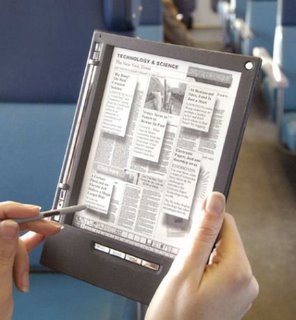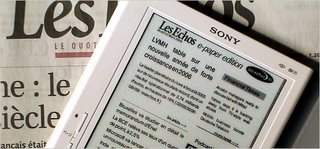e-Paper
Ryan Sholin's blog yesterday about e-paper struck me.
Not because it's such a revolutionary concept or technology - the idea is engrained in much science fiction, as the New York Times article about the Belgian business paper going hi-tech said today. image courtesy of iRex.com
image courtesy of iRex.com
What's significant about e-paper is the possibility for massive convergences. For those of you not total geeks, I'm talking about the coming together of a whole bunch of mediums and technologies to make life more interactive - and open.
Sound far-fetched? Think again.
Imagine a world where wireless networks update citizens' (and students', ahem...ahem...Knight Ridder... *cough*cough* Spartan Daily) e-papers automatically, where citizens can submit updates, modifications and fact-checks to the papers instantly as they read with pens like those used on palm pilots.
Citizen Journalism would take on a whole new meaning. Collectively channeling the brainpower of the readership would also cut the number of actual writers needed, increasing the newspaper'$ profitability.
This would lead to an expansion in the actual number of newspapers that operate independantly.
Plus, local news would become much more in-depth, detailed, and accurate - with comment sections and links only the web could provide. image courtesy of The New York Times
image courtesy of The New York Times
This same principal was applied to Wikipedia and Craigslist, which both became hugely successful and largely accurate. Not to mention Blogger, which I'm currently publishing on.
Tim O'Reilly of the tech magazine MAKE recently spoke about this phenomenon in a podcast on IT Conversations. The podcast is definitely worth the listen. Technologies that incorporate opensource and mass-cooperation, he says in the podcast, are the future.
I see e-paper as having these possibilities and potential, worthy of notice by the University.
sjsu
soapbox prophet
education
technology
ryan sholin
e-paper
Andrew Venegas

